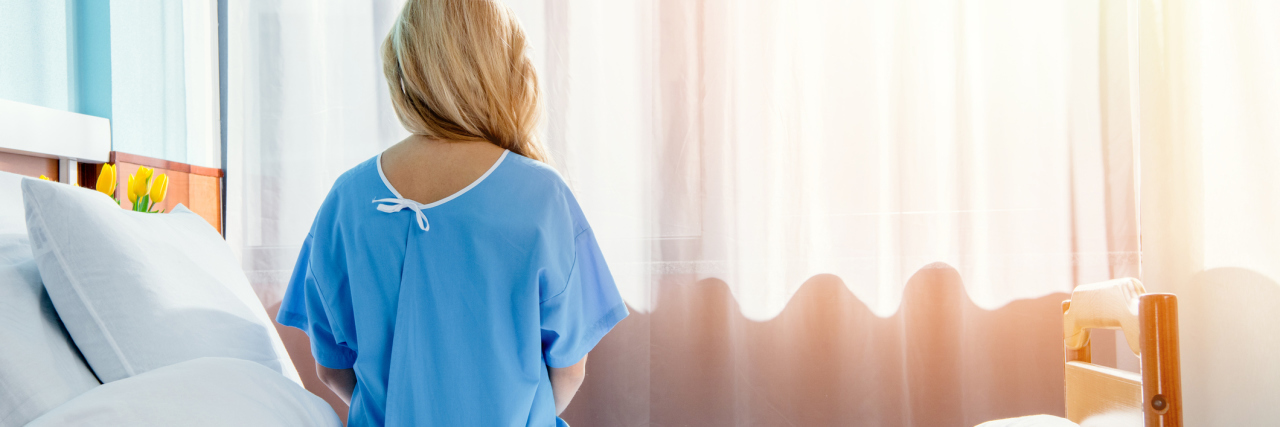Women are three times more likely to die of a serious heart attack than men as a result of receiving unequal care, according to a recent study.
Three. Times.
I write a lot about issues that directly impact the chronic illness community, but the insidious prevalence in which women are disbelieved by the medical symptom is deadly, and it should be of immediate concern to any female-identifying person with a pulse. The rallying cry of “Believe Women” extends to all areas of life, not just human resources and the courtroom. Because if we don’t believe women to be reliable reporters of their own health, we run the risk of literally killing them.
I was diagnosed with Crohn’s disease in 2010. As a child, I suffered a myriad of strange health problems –– I had pneumonia nine times before I was 10 years old. I had constant respiratory problems that were only diagnosed as asthma a few short months ago, at age 26, and only because I aggressively advocated to be tested.
When I was 14, my eyes mysteriously crossed for three months before correcting themselves, something no neurologist or ophthalmologist was ever able to explain. At 16, I missed weeks of school at a time due to migraines so bad I couldn’t do anything but sleep in a dark room. I remember wanting to return to school so badly that I made my mom drive me all the way there one day, only to break down as we entered the parking lot because the pain was so bad I couldn’t put on a brave face anymore. I knew I had to go back home.
Suffice it to say I have always been a compendium of strange medical problems, an insurer’s worst nightmare, and our current medical system doesn’t love things that it can’t categorize into neat boxes. Especially when the complaining patient is a woman. One of my favorite pieces ever written is “The Yellow Wall-Paper” by Charlotte Perkins Gilman, and reading it now, you might think, “It’s wild that we diagnosed women with hysteria for such a wide and dismaying variety of symptoms!” But here’s the thing –– we’re still doing it, we’re just calling it different names. Autoimmune diseases occur disproportionately in women. They’re also incredibly under-studied and often misdiagnosed. It takes on average four years, and four doctors, to be given a correct diagnosis. That’s four years of shuttling yourself to expensive appointments and tests where you’re regularly dismissed, disbelieved, and gaslit into doubting your own physical symptoms.
If I sound like an angry zealot about this, it’s because I am. I have, all too often, been on that side of the doctor’s appointment. I’ve been told that I “look healthy,” or that “sometimes young women just faint a lot!” or that “maybe I’m just stressed.” It has permeated my psyche, making me anxious and disaffected. When I am curled up in a ball on my bathroom floor because I’m in tear-inducing pain, I know that’s real. I know I’m not doing that to myself. But even still, sometimes I have to revisit the photos of my inflammation-ridden intestines to remind myself that this isn’t “all in my head.”
I recently tweeted out asking the women I know to tell me about their experiences of being dismissed by doctors. The responses were jarring, in that they were totally horrifying and yet, I expected them. Even my friends and acquaintances who don’t suffer from the weird kaleidoscope of chronic conditions that I do had stories about their pain being chocked up to “boy problems” or “mean girl drama” at school. One of my male friends shared a particularly illuminating story in the opposite light –– he was once sent to the ER for what his university health clinic thought could be an aneurysm when in actuality he was just overworked and undernourished. If women could experience that same level of concern and urgency from doctors, maybe that “three times” number would be lower. Maybe more of us would be alive, and well.
I’m not pretending that I know all the answers to fix this –– more women in medicine will help, but these biases are so utterly ingrained in our consciousness that even that may not change things fully for women patients. But I’m emboldened by women like Michele Lent-Hirsch, Maya Dusenberry, Abby Norman, and more, who refuse to go quietly into the shadows of the medical system. We need patients with advantages, like me, of a supportive family, job, and education, to speak up for the people who can’t. Because if I often feel on the verge of giving up, it means that women of color, the trans population, and people of lower socioeconomic standings are facing an even more arduous climb. It should not be emotionally traumatizing to seek help for physical pain.
We need to talk about it. We need to yell about it at the top of our lungs. We need to help each other. Because when we talk about and vote about “women’s health,” we can’t only talk about reproductive rights. While access to reproductive healthcare is of imminent importance, women are complex human beings who face plenty of other medical traumas, and who, as of 2018, are not being appropriately treated for it.
Getty photo by LightFieldStudios

